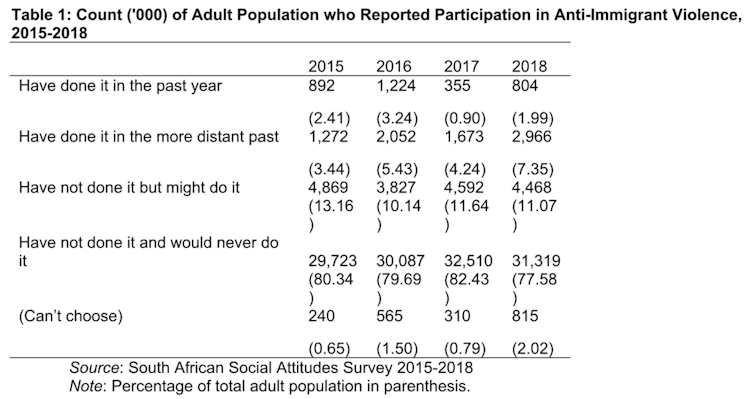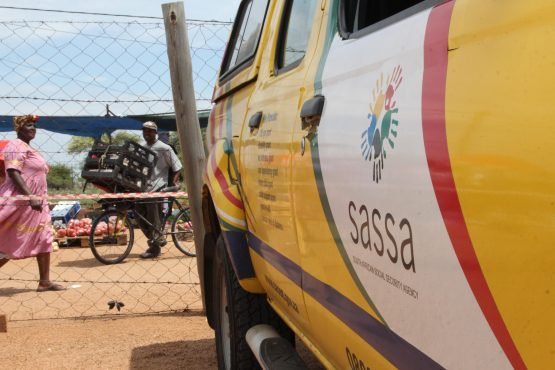-
play_arrow
On The Street On The Air | Kaya 959
- home Home
- keyboard_arrow_right CURRENT AFFAIRS
- keyboard_arrow_right Posts
- keyboard_arrow_rightWhat research reveals about drivers of anti-immigrant hate crime in South Africa
What research reveals about drivers of anti-immigrant hate crime in South Africa

Kim Ludbrook/EPA
Steven Gordon, Human Sciences Research Council
Mobs have attacked foreign-owned businesses on the streets of at least three South African cities in recent days. This has caused outrage across Africa. There have even been retaliatory attacks. The South African government, under pressure to protect her large international migrant community, quickly defused the attacks.
Such attacks are not new. For more than two decades, this type of crime has bedeviled the country. There is growing frustration that so little has been done to stop it.
To combat anti-immigrant hate crime, we need to understand its drivers. Scholars at the Human Sciences Research Council have recently made new discoveries about the drivers of anti-immigrant hate crime in South Africa.
We found that a significant share of the general population hold anti-immigrant views and blame foreign nationals for many of the socio-economic challenges facing South African society. Yet there is little empirical evidence that immigrants are driving problems like crime or unemployment.
But beliefs about the role played by foreign nationals in the country clearly influence how people think about anti-immigrant hate crime. Anti-immigrant statements by politicians also feed into the problem.
Tracking anti-immigrant hate crime
Data from the South African Social Attitudes Survey, conducted annually since 2003, was used. The survey series consists of nationally representative, repeated cross-sectional surveys. It is designed as a time series and is increasingly providing a unique, long-term account of the speed and direction of change of public participation in anti-immigrant behaviour in contemporary South Africa.
Using this data, researchers have found that anti-immigrant hate crime is more widespread than previously thought.
Beginning in 2015, the following item was added in the survey questionnaire:
Have you taken part in violent action to prevent immigrants from living or working in your neighbourhood?
People may be disinclined to disclose this type of potentially incriminating information during face-to-face interviews. But community research suggests that the stigma attached to participation in xenophobic activities may not be as great as we may imagine. Still, the reader should be aware of this possible under-reporting of anti-immigrant behaviour when reviewing the survey’s results.

A minority of the South African adult population reported that they had participated in this form of anti-immigrant aggression. The share of the general public who admitted engaging in violence fluctuated within a very narrow band over the period 2015-2018. This shows the willingness of survey participants to respond to this question varies by only a small margin between the two periods. It also suggests a linear relationship between behavioural intention and attitudes.
The survey results demonstrate the ugly reality of violent anti-immigrant hate crime in South Africa. Although this is an important and dangerous type of prejudice, such crime is not the only form that xenophobia may take. Other forms of peaceful anti-immigrant discrimination are also evident in South African society.
Research has shown that more peaceful forms of anti-immigrant activities are often the first step in a process of escalation that leads to xenophobic violence. Past participation in peaceful anti-immigrant activity (such as demonstrations) was found to be a major determinant of this type of violence.
For this reason, we suggest in our study,
policymakers should consider non-violent anti-immigrant activities as early warning signs of forthcoming anti-immigrant hate crime.
Conclusion
One of the most troubling findings to have emerged concerned possible participation in anti-immigrant aggression among those who had not taken part before. More than one in ten adults living in South Africa reported in the 2018 survey that they had not taken part in violent action against foreign nationals – but would be prepared to do so.
This finding is quite disturbing given that there may be under-reporting of the propensity for violent action. Anti-immigrant stereotypes were shown to be a robust driver of this kind of behavioural intention. This suggests that anti-immigrant attitudes could have a mobilising effect, spurring individuals towards acts of violent xenophobia.
The results of this study show that millions of ordinary South Africans are prepared to engage in anti-immigrant behaviour. So it is vital that the resources dedicated to combating xenophobia be equal to the size of the problem.
The South African government has a national action plan to combat racism, racial discrimination, xenophobia and related intolerance. The progressive measures put forward in the plan include immigrant integration, better law enforcement, civic education and increased immigrant access to constitutionally entitled rights.
Recent research suggests that many of these measures have a degree of public support. The plan was approved in March this year. If it’s to work, it requires adequate resources and support from all sectors of South African society.
Instead of focusing on short-term solutions civil society, foreign governments and the general public must work with the state to progressively implement this plan.![]()
Steven Gordon, Senior research specialist, Human Sciences Research Council
This article is republished from The Conversation under a Creative Commons license. Read the original article.
Written by: Zuko
Afrofobia South Africa Violence directed against migrants Xenephobia
Similar posts
-
MORE ARTICLES

“Never thought it would go this far” – Laduma Ngxokolo reacts to Michelle Obama outfit

The funeral details of TikToker Kagiso “Pope” Ramoshai revealed

WATCH: Khuli Chana releases artistic visuals for song “KHULI YANO”

Having a competitive nature in the workplace

TikTok sensation Aus Velemina to be laid to rest this Saturday
-
QUICK LINKS
UpComing Shows

Feel Good
With Andy Maqondwana
Feel good about feeling good! That's exactly what The Feel-Good show is about. An escape from the negativity that surrounds us, indulging you in good feels. Pass it on to one and all. Spread the good feeling around Gauteng with Andy Maqondwana.
close
Kaya Biz
With Gugulethu Mfuphi
The world of business is simplified for you by Kaya Biz with Gugulethu Mfuphi. This fast-paced award-winning business show talks to the corporate giants as well as up and coming entrepreneurs about their wins and challenges. Gugulethu invites guests to offer their analyses of markets and economies, and also delves into issues of personal financial wellness. Kaya Biz airs Mondays to Thursdays 18h00 to 19h00.
close
Point of View
With Phemelo Motene
Point of View with Phemelo Motene delves into the day’s current affairs, touches on real issues that affect people’s daily lives and shares expert advice on questions posed by the audience. Mondays to Thursdays 20:00 to 22:00.
close
959 Music Weekdays
Kaya 959 Hits
Real. Familiar. Memorable. Kaya 959 brings you the music you know and love from our playlist. Uninterrupted. Thursdays 20h00 to 21h00
close
The Best T in the City
With T Bose
He has held it down in the world of mid-morning radio with the best music, riveting topics, brilliant mixes and interesting guests. Every weekday, The Best T proves why he is the BEST by connecting to you like only your bro or favourite uncle could. He lets his listeners dictate the songs they want to hear in the ever-popular Top 10 at 10, and his Three Teaspoons never run out. Catch The Best T in the City Mondays to Fridays from 09h00 to 12h00.
closeConnect with Kaya 959
DownLoad Our Mobile App
© 2024 Kaya 959 | On The Street On The Air











